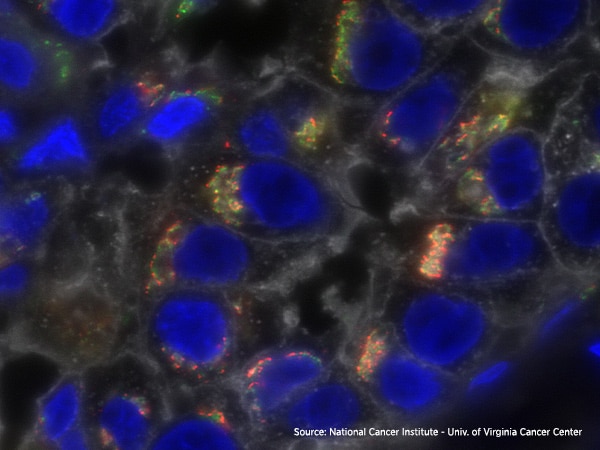First Immunotherapeutic Approved for Breast Cancer
The FDA approval is for the use of atezolizumab in combination with Abraxane for the treatment of certain patients who have triple-negative breast cancer.

The U.S. Food and Drug Administration (FDA) recently approved the use of atezolizumab (Tecentriq), a type of immunotherapeutic called a checkpoint inhibitor, to include the treatment of certain patients who have locally advanced or metastatic triple-negative breast cancer.
Atezolizumab is intended for use in combination with a cytotoxic chemotherapeutic called nab-paclitaxel (Abraxane) for treating adults who have unresectable locally advanced or metastatic triple-negative breast cancer that tests positive for the protein PD-L1. This is the first time that immunotherapy has been approved to treat breast cancer.
Triple-negative breast cancer accounts for about 12 percent of breast cancers diagnosed in the United States each year, or about 32,000 cases of this particularly aggressive form of breast cancer in 2019. Breast cancers are classed as triple-negative if they test negative for hormone receptors and the protein HER2.
Until now, cytotoxic chemotherapeutics were the only systemic treatment options for patients with triple-negative breast cancers. Even with such treatment, researchers estimate that the median overall survival for patients with triple-negative breast cancer is less than 18 months.
Atezolizumab works by releasing a brake called PD-1 on natural cancer-fighting immune cells called T cells. It prevents a protein called PD-L1 from engaging the PD-1 brake, freeing T cells to destroy cancer cells.
The approval of atezolizumab for use in the treatment of triple-negative breast cancer was based on results from the randomized, placebo-controlled phase III IMpassion130 clinical trial. Among patients who had unresectable locally advanced or metastatic triple-negative breast cancer that tested positive for PD-L1, adding atezolizumab to nab-paclitaxel significantly improved the median time to disease progression; median progression-free survival was 7.4 months for those receiving the combination treatment versus 4.8 months for those receiving placebo and nab-paclitaxel.
More detailed results of the Impassion130 clinical trial were published in the New England Journal of Medicine. These results showed that 58.9 percent of patients with PD-L1-positive triple-negative breast cancer who received atezolizumab and nab-paclitaxel had partial or complete tumor shrinkage, compared with 42.6 percent of those who received placebo and nab-paclitaxel.
Triple-negative breast cancer is the third type of cancer for which atezolizumab has been approved; it was approved for treating certain patients with bladder cancer in May 2016 and for treating certain patients with non-small cell lung cancer in October 2016.
The FDA approval was rendered on March 8, 2019.